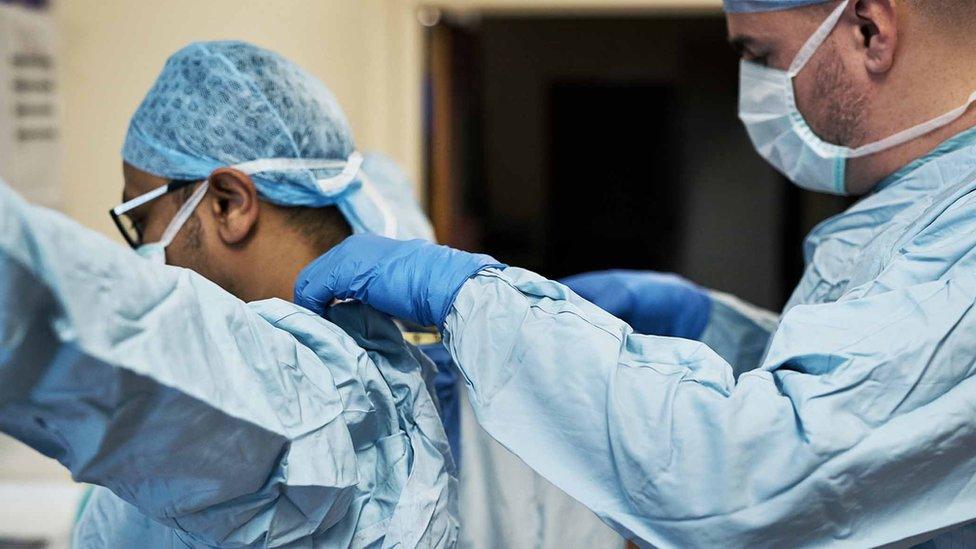Coronavirus: Tsar says PPE shortage crisis is over
- Published
Lord Deighton has admitted the government was in "crisis management" over the PPE shortage in April
The business leader brought in by the government to sort out shortages of personal protective equipment (PPE) for health and care workers in England has told the BBC that "crisis management" was required during and immediately after the peak of coronavirus cases.
Lord Paul Deighton said that supplies were now stable and had been secured for the rest of the year.
There are 28 billion items on order, he says.
He took on the role in late April.
In an exclusive interview with BBC News, he said "the early period was one of crisis management…We had long meetings every morning and evening trying to make sure we had precisely the kit coming in that was needed on the frontline next day and that's not a circumstance you want to find yourself in".
He acknowledged that there had been a "big problem" with staff feeling unsafe going into work because of fears that PPE would run out.
And he said the driving purpose had been to "reduce that anxiety so people could go to work and save lives, not worry about whether they are going to get a mask or a pair of gloves".
The Department of Health and Social Care has said 2 billion items of PPE have been delivered to NHS and social care workers in England since February including:
341 million masks
313 million aprons
4 million gowns
1.1 billion gloves (supplied and counted individually rather than as pairs)
Data on demand and usage of PPE is hard to get hold of.
BBC analysis in April suggested that hospitals in England were using between 10 and 16 million items a day. A trust in Lincolnshire with three main hospital sites said it got through about 73,000 items a day.
Lord Deighton said there were a few issues still with certain items, including specialist FFP3 masks for intensive care and gloves.
But he added: "Broadly speaking we have moved from the emergency situation we were in a month or so ago to a stable situation which provides us with a foundation to prepare with resilience for any second spike or new wave in the autumn or winter."
He said the previous problems had stemmed from a "huge spike in demand and the limited supplies of equipment" and processes were now in place "to make us more resilient for the future".
One of the problems facing the UK at the start of the pandemic was a very small domestic supply base for PPE. Almost all of it came from foreign manufacturers including in China.
At the height of the crisis, civil servants were swamped with offers from British businesses to make equipment for the NHS but they struggled to work out which were credible and sustainable.
Need for 'right equipment at the right time'
Lord Deighton's team whittled the list down to 30 companies and offered contracts for longer term production.
One example is Photocentric, a Peterborough based manufacturer of 3D printers, which within a few weeks created a new production line for faceshields and is now making a third of a million per week. By the end of the year it is predicted by officials that about 20% of PPE requirements will be made in the UK.
To tackle the crisis and sort out future supplies, Lord Deighton brought in colleagues who had helped plan logistics for the London 2012 Olympics. Ministry of Defence officials were also drafted in to negotiate contracts for more than 10 billion items of PPE.
A department known as Defence Equipment and Support equips the Army, Royal Navy and Royal Air Force with items ranging from jets and warships to field kitchens. Its officials led a 270-strong workforce running a 'New Buy PPE' team.
The work headed by Lord Deighton has been for PPE supplies in England but some, on request, can be made available to the authorities in Scotland, Wales and Northern Ireland. The devolved administrations are responsible for their own procurement of equipment.
Private donors and organisations have stepped to help. The Daily Mail raised £10m through donations. Its campaign, called MailForce, has involved three airlifts from China and has seen more than 100 tons of PPE delivered to the NHS and care homes.
Saffron Cordery, deputy chief executive of NHS Providers which represents trusts in England, said it was welcome news that the supply of PPE does now appear to have improved.
But she added: "Trust leaders still need assurance that they can guarantee that every frontline health and care worker will receive the PPE they need, when they need it."
A spokesman for the British Medical Association said: "As we turn our attention to preventing or combating a second wave, we cannot afford to focus on the just the number of PPE items being supplied.
"We must ensure the right equipment reaches the areas of most need at the right time. "
- Published12 June 2020
